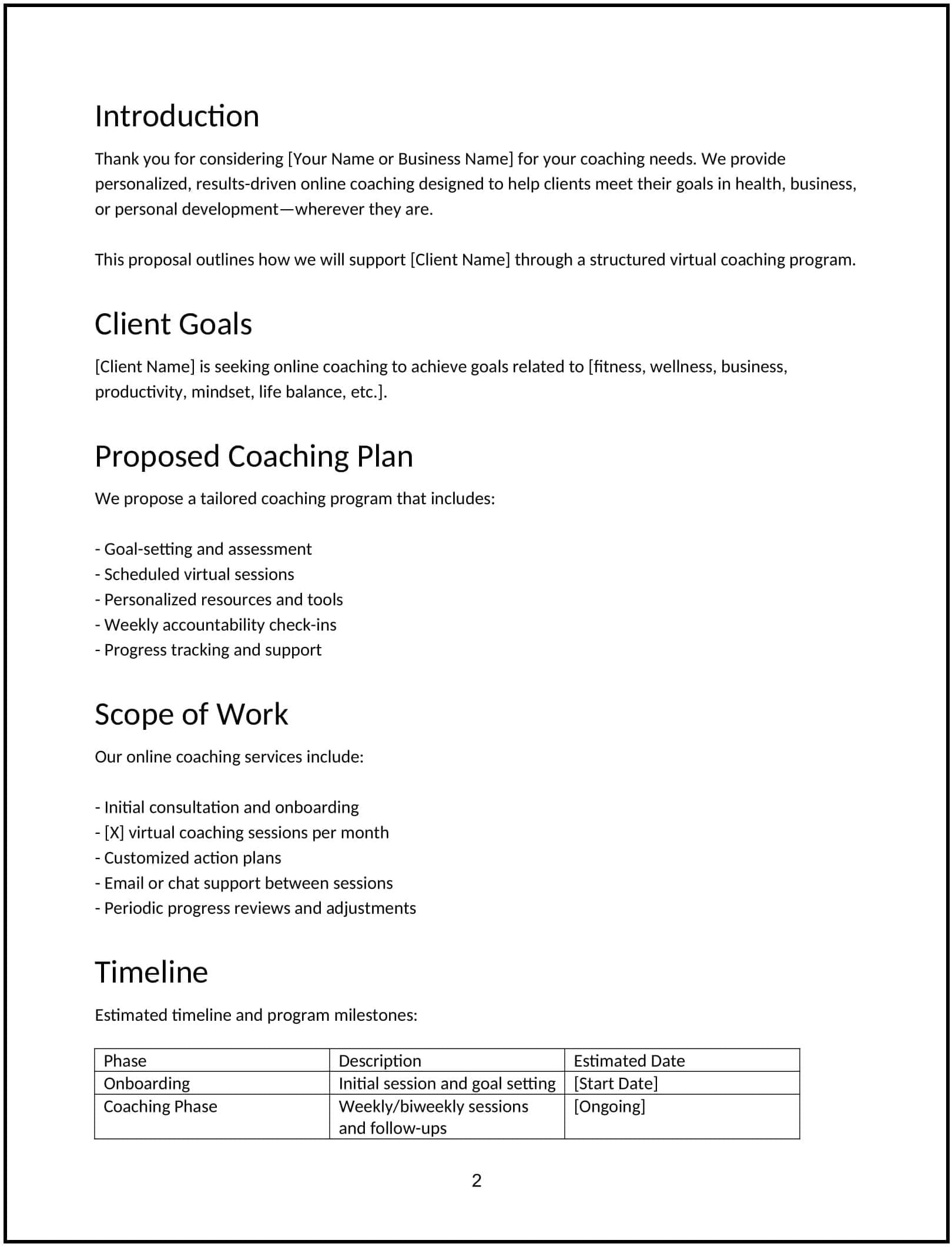Proposes online coaching services, detailing coaching goals, session format, communication tools, and pricing.
Got contracts to review? While you're here for proposals, let Cobrief make contract review effortless—start your free review now.

Customize this template for free
Customize this free online coaching proposal with Cobrief
Open this free online coaching proposal in Cobrief and start editing it instantly using AI. You can adjust the tone, structure, and content based on your coaching niche, delivery format, and client goals. You can also use AI to review your draft — spot gaps, tighten language, and improve clarity before sending.
Once you're done, send, download, or save the proposal in one click — no formatting or setup required.
This template is fully customizable and built for real-world use — ideal for life coaches, business coaches, mindset or executive coaches, and niche-specific coaches (fitness, nutrition, career). Whether you’re offering one-on-one, group, or hybrid programs, this version gives you a structured head start and removes the guesswork.
What is an online coaching proposal?
An online coaching proposal outlines the structure, pricing, goals, and communication style of a remote coaching engagement. It’s typically sent after an intro call or discovery session and helps the client understand exactly what’s included — from calls and check-ins to tools and resources.
A coaching proposal builds trust, reduces friction, and turns curiosity into commitment.
An online coaching proposal helps:
- Clarify the structure, expectations, and approach
- Reinforce the value of your service and coaching style
- Provide clear pricing and next steps
- Build professionalism and trust before the program begins
If you're coaching clients remotely and want to formalize your offer, this is the format to use.
Why use Cobrief to edit your proposal
Instead of typing out long emails or sending disorganized docs, use Cobrief to create a clear, client-ready proposal — with built-in AI help at every step.
- Edit the proposal directly in your browser: No formatting required — just click and customize
- Rewrite sections with AI: Clarify your offer, refine your tone, or expand on benefits
- Run a one-click AI review: Catch gaps, vague promises, or unclear structure before sending
- Apply AI suggestions instantly: Review edits one-by-one or polish the whole proposal in a single click
- Share or export instantly: Send as a live link or download a clean, professional PDF or DOCX
Cobrief helps you move fast while keeping your offer professional, personalized, and easy to say yes to.
When to use this proposal
This online coaching proposal is perfect for:
- Offering 1:1 or group coaching programs
- Proposing a structured 4-, 8-, or 12-week coaching plan
- Responding to discovery calls or DM inquiries
- Formalizing pricing, schedule, and tools after an intake form
- Pitching a signature program, cohort, or rolling enrollment
Use this when you’re ready to go from “interested” to “enrolled.”
What to include in an online coaching proposal
Each section is built to guide the client through the offer clearly and confidently. Here's how to use them:
- Executive summary: Recap the client’s key goals and how your coaching will support them (e.g., “This 8-week program is designed to help you build momentum, clarify your vision, and create structure and accountability as you grow your personal brand.”)
- Program structure: Outline what’s included — weekly coaching calls, private messaging, resources, video trainings, check-ins, or custom feedback.
- Coaching philosophy: Share how you work — direct, supportive, goal-oriented, reflective — and what clients can expect from your style.
- Tools and communication: Clarify how sessions are hosted (Zoom, Google Meet), where communication happens (email, Slack, WhatsApp), and any tracking tools or worksheets used.
- About you: Share a short summary of your background, relevant wins, and coaching focus. Keep it outcome-oriented, not résumé-heavy.
- Pricing: List your rates — one-time, monthly, or package pricing. Be clear on what’s included and when payments are due.
- Terms and conditions: Include your cancellation policy, communication expectations, session expiration windows, and refund policy.
- Next steps: End with a clear CTA — e.g., “Reply to confirm and schedule your kickoff session,” or “Click to approve and complete onboarding.”
How to write an effective online coaching proposal
You’re not selling time — you’re selling transformation. Use these tips to make your proposal land:
- Focus on the outcome, not just the format: What will life or business look like after working with you?
- Keep structure simple and clear: Show session frequency, call length, and support access in plain terms
- Be transparent on pricing and scope: What’s included — and what’s not — should be obvious
- Match your tone to your style: If you’re bold and direct on calls, keep that same energy in the proposal
- Make it easy to start: One CTA, no over-explaining — just clear forward momentum